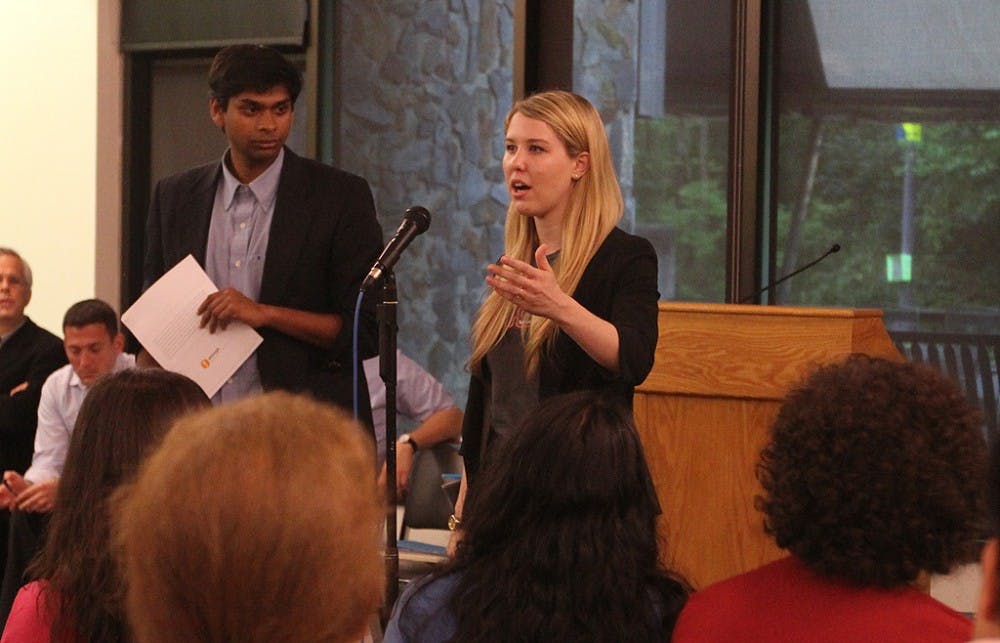Duke is making progress on a path to potentially become free of conflict minerals and the interests of companies using the materials.
For the past six months, the Coalition for a Conflict-Free Duke has been pushing the University to consider a shareholder resolution that would ask Duke to take conflict minerals into account when investing in electronic companies. For the first time in five years, the Advisory Committee on Investment Responsibility conducted an open session Wednesday, where a crowded room discussed Duke’s financial relationship with conflict minerals in Africa. If the initiative is successful, Duke will be the second university in the nation, following Stanford University, to pass a shareholder resolution regarding conflict mineral trade.
The sale of conflict minerals is largely responsible for fueling violence in the Democratic Republic of the Congo.
“It’s high time that we’re talking about investment responsibility at Duke,” said CCFD Chair Stefani Jones, a sophomore. “There’s something wrong ... when we don’t know if our cellphones are funding the deadliest war since World War II.”
CCFD’s proposed voting guide would request that shareholders vote to approve resolutions asking companies for information and increased transparency regarding their involvement in conflict mineral trade.
The committee hopes to advise President Richard Brodhead about conflict mineral investment policy by the end of the semester, said ACIR Chair Jonathan Wiener, William R. and Thomas L. Perkins professor of law. The committee meets only when requested and provides investment recommendations to Brodhead, who can then present the recommendations to the Board. Only the Board has the power to influence shareholder policy.
The forum provided an opportunity for the ACIR to gain insight about how the conflict mineral trade causes substantial social injury and how CCFD’s desired change would have a direct effect in alleviating this injury.
The Democratic Republic of the Congo has suffered 15 years of violence and unrest, with more than five million casualties, according to an informational document provided by the CCFD at the event. It has also gained designation as the rape capital of the world. This violence has been fueled in part by the illicit trade involving minerals widely used in consumer technology products, as well as food packaging and industrial goods.
Between 20 and 40 percent of the Congo’s warlords’ revenue comes from these conflict minerals, Jones said.
“Tonight was about getting that real, personal connection,” said junior Sanjay Kishore, CCFD member and president of Duke Partnership for Service. “It wasn’t about us at all—it was about hearing from folks who are in the Congo, who do research in the Congo, who have some kind of connection.”
Rachel Shukuru, a political refugee from the DRC who attended the event, said it is necessary to convince companies to take responsibility for their actions.
“Thank you for working to help Congo, to help those people who are suffering,” Shukuru said to the crowd.
Sophomore Nyuol Tong, a student from South Sudan and a columnist for The Chronicle, spoke at the event about a sense of guilt and moral obligation regarding problems in Africa throughout Western society.
“The issue will be solved by the people on the ground,” Tong noted. “But if [Duke stops] supporting these companies, that will be a mitigating factor.”
In addition to affecting people, the conflict mineral trade also affects plant and animal life in the DRC, noted Brian Hare, assistant professor of evolutionary anthropology. Eastern Congo is one of the most biodiverse places in the world, he noted, adding that he studies the psychology of great apes, some of which only live in the DRC.
“When people are suffering in eastern Congo, so are all of the endangered species that live in the forest” Hare said. “When people are exploiting the forest for minerals, they are also exploiting the native species—it’s adding insult to injury.”
Several students also noted that efforts to eliminate the illicit conflict mineral trade should not have a negative effect on mines in the region that are already regulated.
“When dawn strikes in the Congo tomorrow, what will they be waking up to?” said junior Alikiah Barclay. “If there’s anything we can do to change that for the better, let’s do it.”
Get The Chronicle straight to your inbox
Signup for our weekly newsletter. Cancel at any time.

